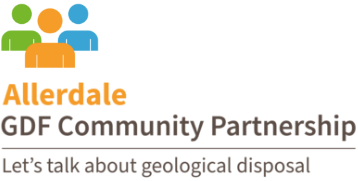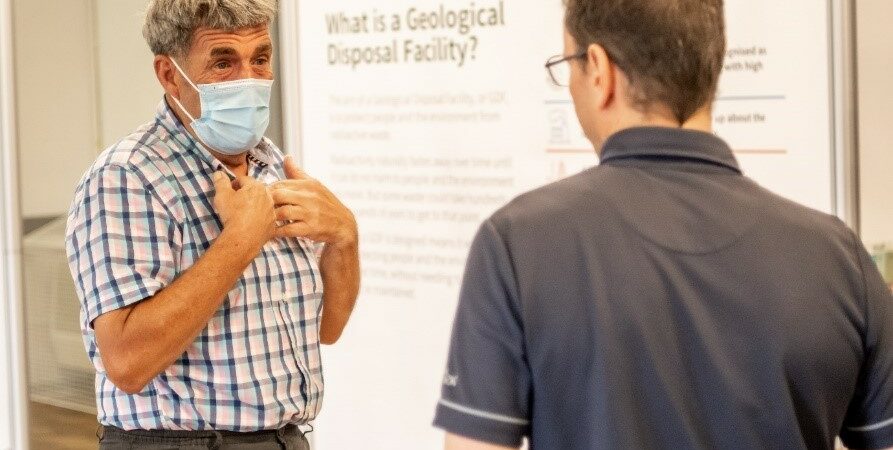WE’RE SORRY…
You were expecting something from us, and we didn’t deliver.
Some of you might be aware that we had planned to send a leaflet to every household in Allerdale to introduce ourselves and explain more about the project and the process. This leaflet was supposed to come through your letterbox in July, but we know that most of you never received it.
Unfortunately, we were let down by the distributers.
To fix this, we’ve sent it again, this time in an envelope and delivered by first class Royal Mail.
We are confident that Royal Mail will do the job, but if you live in Allerdale and have not received a leaflet from us by Friday 9th September, please let us know by emailing: gdfinfo-allerdale@nda.gov.uk

STUDENTS DEBATE GDF
Working with Inspira to hear the views of young people
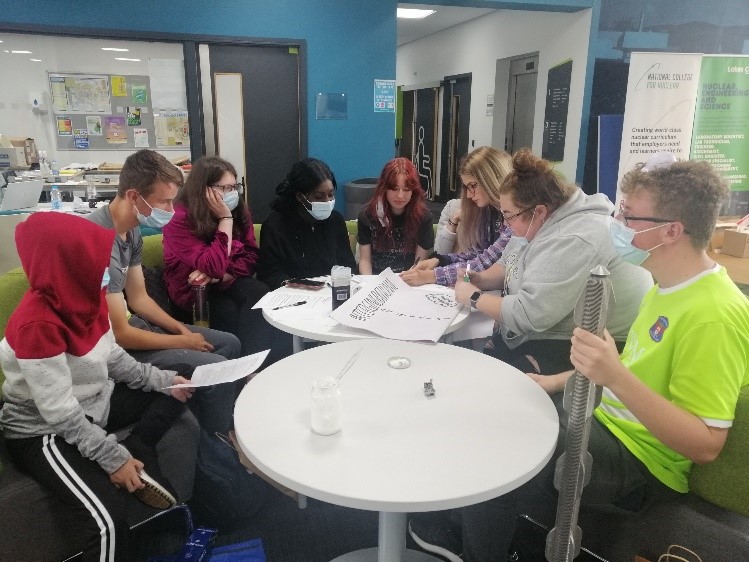
Last month, with the help of Inspira, we met with young people to understand their views on the future of nuclear waste disposal and what it could mean for them.
The event, which was part of the National Citizen Service (NCS) programme, took place at Lakes College in Workington.
55 Lakes College students aged 15-17 discussed the potential environmental and community impacts of building a Geological Disposal Facility, with specific emphasis on the questions students would have for local councillors and Radioactive Waste Management (the developer) if a Geological Disposal Facility was proposed in their community.
Paul Skelton of Radioactive Waste Management and member of the Institute of Physics was present to explain what nuclear waste looks like, where it’s currently stored and how Radioactive Waste Management propose to dispose of it.
Eva Chua, who represents Radioactive Waste Management on the Working Group, spoke with students to explain the Geological Disposal Facility siting process and the role of the Working Group and gave details of the community investment funding which would be made available to communities if a Community Partnership is formed.
Students were later given an opportunity to ask questions about the Working Group process and make suggestions as to how we could best engage with young people.
Students also heard from representatives of the nucleargraduates programme, including former graduates, who talked about the opportunities for young people in STEM subjects (science, technology, engineering, and mathematics).
Launched in 2008 by the Nuclear Decommissioning Authority (NDA), nucleargraduates is a unique two-year graduate development programme that plays a key role in attracting diverse talent into the nuclear sector.
The programme is helping to influence the next generation of young people and encouraging them to consider a career in the nuclear industry. To date, it has recruited over 400 graduates into a broad range of specialisms including engineering, science, human resources, commercial, project management, communications, strategy and risk, and focusses on both professional and personal development.
It works by pairing students with sponsor organisations, including Radioactive Waste Management (RWM) the NDA, Sellafield Limited, Magnox Limited, International Nuclear Services Limited (INS), Rolls-Royce, Office for Nuclear Regulation (ONR), and the Environment Agency, to equip them with the skills they need to work in their chosen field, as part of a structured and supportive training programme.
If you know any young people who may be interested, applications for the 2022 intake of nucleargraduates is now open and information about applying to the programme can be found on the website – www.nucleargraduates.com
It was fantastic to meet the students and hear their views. Their feedback was wide ranging, and they gave us great insight into what matters to young people in Cumbria.
They’ve let us know about their vision for their community and provided us with some excellent suggestions for engaging with other young people, which we’ll be taking forward.
Listening to young people is an absolutely critical part of- these early conversations and helps the Working Group to understand the vision for local communities.
We’re incredibly grateful to all the organisations involved in this event, including Inspira, Lakes College, Radioactive Waste Management and nucleargraduates, but most of all to the students, who really engaged on the subject.
Thank you to you all.
YOU TALKED, WE LISTENED
An initial reflection on our community drop-in sessions
Over the course of five weeks following the lifting of Covid-19 restrictions, we ran 12 community drop-in sessions at venues across Allerdale including Wigton, Maryport, Cockermouth, Workington and surrounding villages. We listened to concerns, answered questions and heard passionate arguments both for and against Allerdale hosting a Geological Disposal Facility.
You told us that you wanted us to be clearer about the process, better advertise opportunities to come and talk to us, use less jargon, and ensure we are engaging with young people, andwe’re taking all that feedback on board to share with representatives of a Community Partnership, should the process continue.
If you attended a drop-in and would like to leave feedback, that would really help us improve how we go about things, and you can do that here: HERE
You also told us that you were interested in knowing what others had to say, so here’s an initial snapshot of your views, which we’ll report in more detail in the next newsletter:
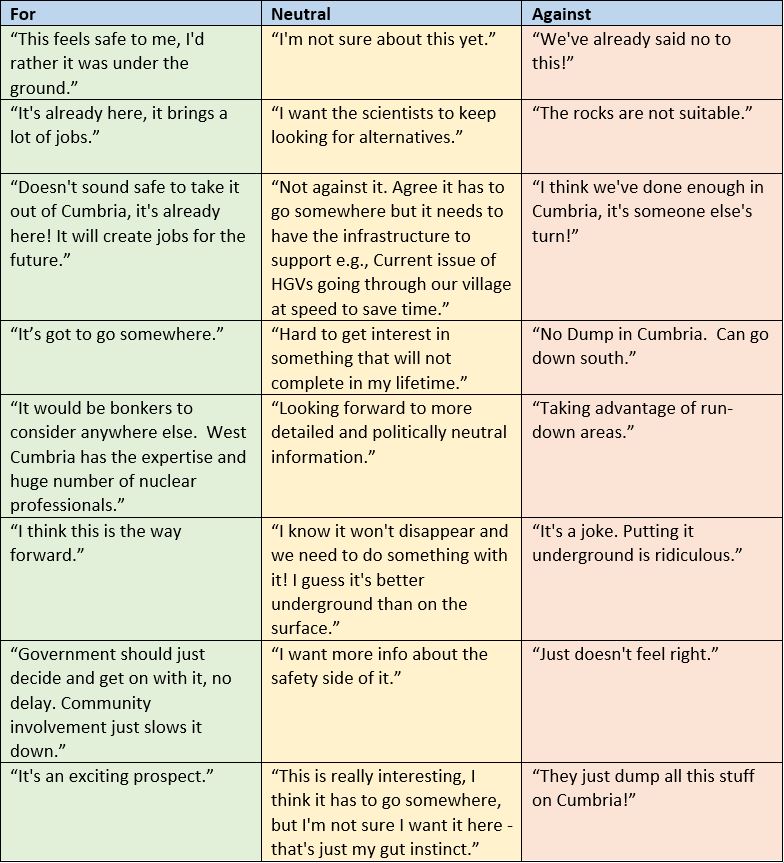
Your biggest concern? Safety, and you wanted more information.
SO, HOW DO WE KNOW THIS IS SAFE?
We know that radioactive waste is something we need to deal with, but how can we be sure that a Geological Disposal Facility would be a safe solution?
Nuclear technology has been part of our lives in the UK for more than 60 years and is used in a range of industries, including medicine and in the generation of power, all of which produces waste which needs to be managed safely.
The UK is not unique in having to safely manage radioactive waste and it is internationally accepted that the safest long-term solution is taking it deep underground into a facility specially designed to securely dispose of it – this is what is referred to as ‘geological disposal’.
It involves sealing the waste in a system of engineered tunnels and vaults between 200 metres and around 1,000 metres below the surface in a stable rock formation, with the containers surrounded by a suitable material and the excavated areas also being backfilled with suitable material.
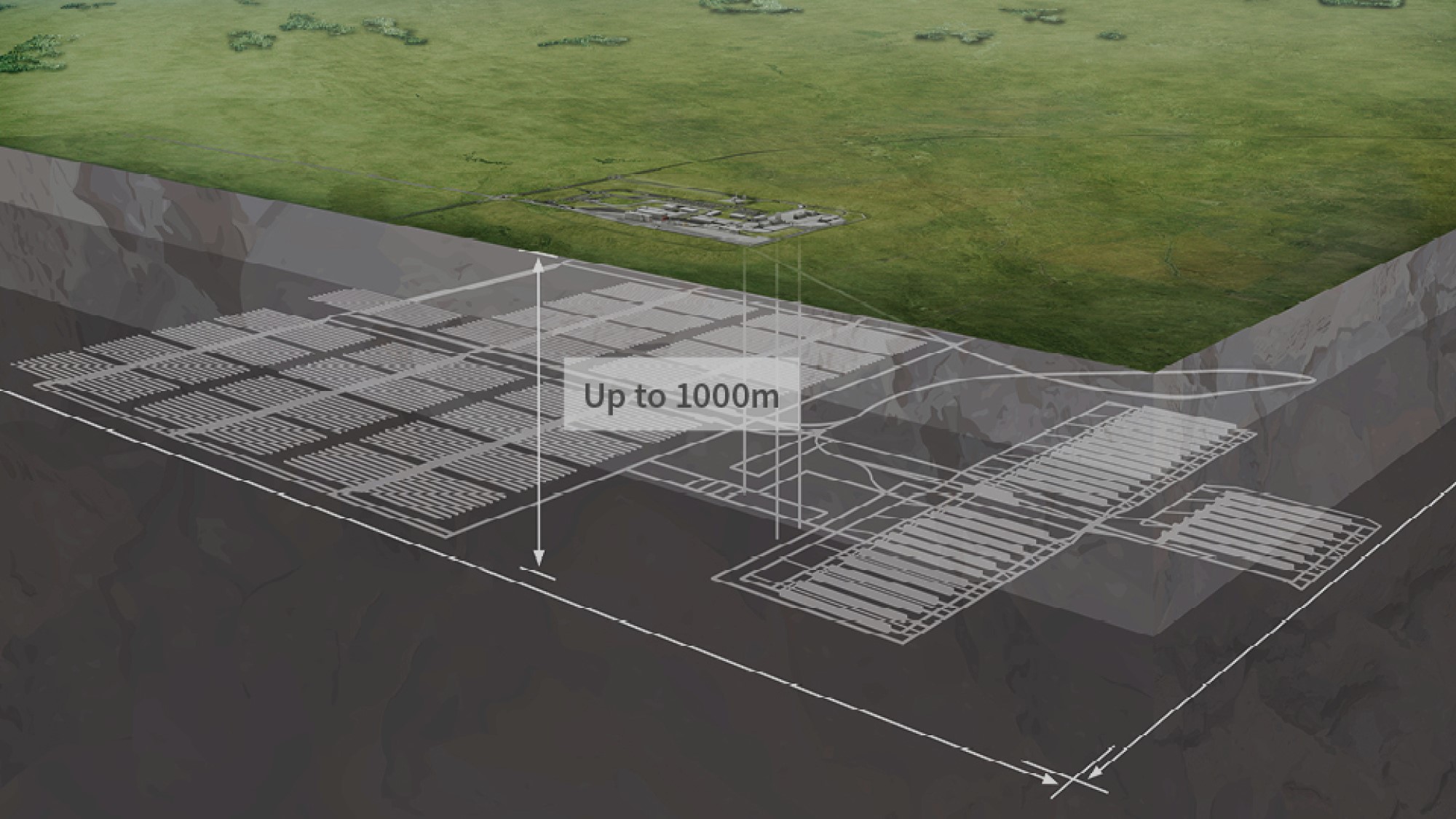
This ‘multi-barrier approach’ involves a combination of engineered and natural barriers working together to contain the waste and isolate it from the surface. The long distance between the waste and the surface means that no harmful quantities of radioactivity from the Geological Disposal Facility will ever reach the surface, and most rocks deep underground have remained buried and stable for millions of years, so here the waste is protected from natural occurrences such as climate change, earthquakes, and potential glaciations.
The UK’s world class science and technology experts have been working on the research that underpins this for decades and believe it to be a safe and permanent solution. Identifying a site and constructing and operating any facility will also build on best practice from the current storage of waste and from other industries, such as the oil and gas industry, where they already use rocks to act as barriers to movement.
Radioactive Waste Management will also be working with nuclear waste producers to make sure records are provided and to understand the waste and ensure that it is packaged in a way that is acceptable for disposal and that the containers are appropriate for that waste type.
Once the waste is positioned deep underground, the containers will be protected by outer materials, selected to work with the natural barrier, creating a chemical environment that protects the containers and acts as a further barrier when those containers do eventually degrade.
Before any of this can happen, the developer (Radioactive Waste Management) will need to carry out detailed investigations to understand the geological features and properties of the site and how it will evolve, including in the event of any environmental changes or events. This is called ‘site characterisation’ and will also identify the movement of groundwater. A Geological Disposal Facility would only be built in a location where there is no, or very slow, movement of groundwater between the location of the facility and the surface, and we’ll be explaining more about groundwater in our next newsletter.
Safety is the absolute priority here, and Radioactive Waste Management are working with experts in the UK and overseas to understand how the waste and the Geological Disposal Facility will behave over a very long time, to bring a safety case to the regulators responsible for making sure that any facility meets their standards for protecting people and the environment. Regulators will only issue licenses and permits when they are satisfied that the standards will be met and where they can be sure it will never cause harm.
We hope that gives you an overview and some assurances around the safety of a Geological Disposal Facility, but if you would like to ask questions, or go into any of this in more detail, or you would like us to deliver a presentation to your group or organisation, please get in touch.
WHAT HAPPENS NOW?
This is only the very beginning of the conversation, and we will be spending some time analysing in more detail your comments and feedback from both the face-to-face and online events.
Now that we have started the conversation, the Working Group’s next priority is to identify a Search Area for consideration and potential members for a Community Partnership, which would take the conversation further forward.
We’ll come back to you in our next newsletter with a full report on what you told us, along with answers to some of your most frequently asked questions and an outline of what to expect next, but please get in touch if you want to share any comments or suggestions or have a question for Working Group members in the meantime.
MEET US ONLINE
Join our online community session on Thursday 9th September, 7-8pm
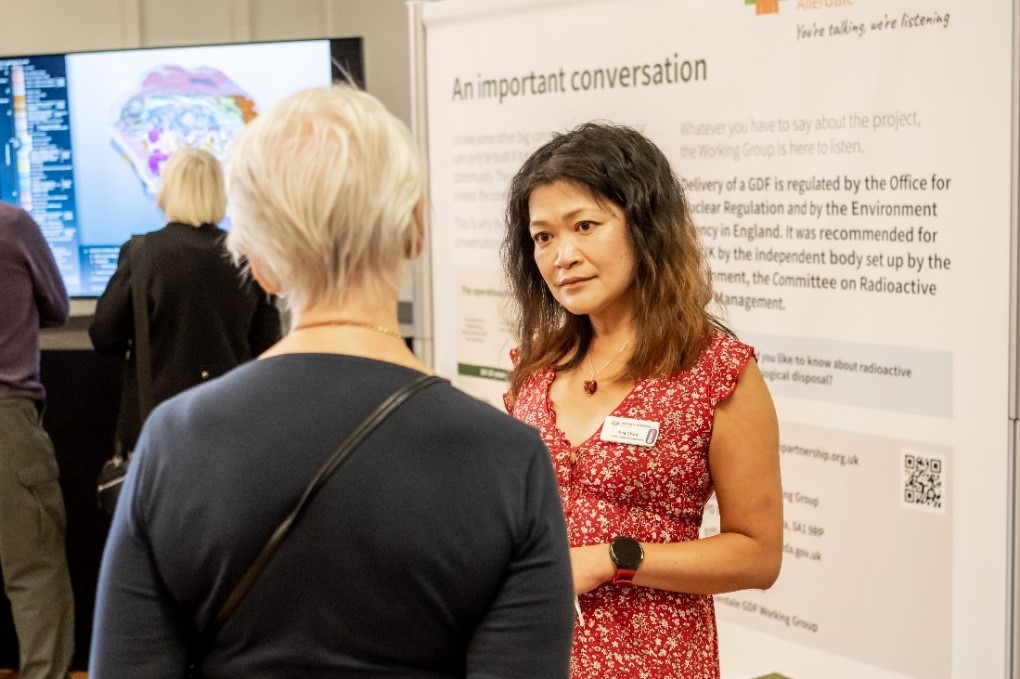
The second of our online community sessions is taking place on Thursday 9th September, between 7-8pm on Zoom.
If you have not yet been able to attend a face-to-face event, this another opportunity for you to join the conversation about whether somewhere in Allerdale could be the right place to build a Geological Disposal Facility to dispose of nuclear waste, if the process continues to Community Partnership stage.
‘We need to talk about Geological Disposal’ will be hosted by Community Organisers and will introduce you to the role of the Working Group, before moving on to a series of ‘breakout rooms’ where you will be able to ask questions, find out more information and discuss your thoughts with other participants.
Book your place HERE
LEARN MORE
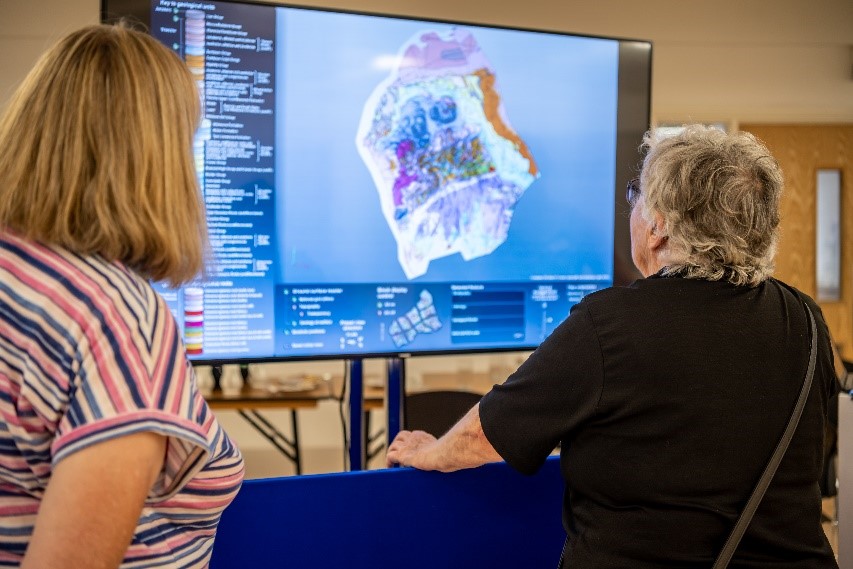
You can learn more about geological disposal on our website, where there are a range of informative and educational resources created by Radioactive Waste Management, including:
- An introduction to geological disposal
- Community Guidance – how we will work with communities in England
- Site evaluation in England
- What is radioactive waste?
- What will go into a GDF?
- Geological disposal: the multi-barrier approach
- What will a GDF look like?
There are also six, easy to follow, interactive e-learning modules to help you understand more about radioactive waste and the GDF process:
